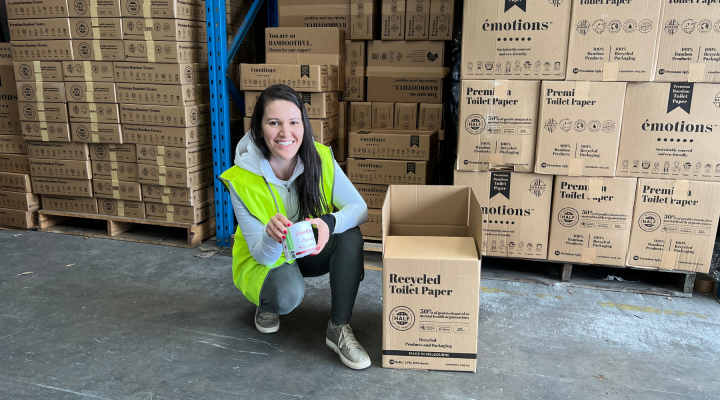This week we talk to Rochelle Rich, a seasoned executive who went on to set up Emotions, which produces essential paper products that promote not only sustainability but also provide comfort for people to reflect on their feelings during moments of solitude. The brand also actively promotes mental health awareness by directing a significant portion of its sales towards mental health research and suicide prevention efforts by organisations such as Beyond Blue, Lifeline, and the Black Dog Institute.
ISB: What was the motivation behind you founding Emotions?
RR: In 2020, after the heartbreaking loss of a loved one to suicide, I focused on teaching my son about emotions, leading me to create an emotions chart. This was at a time of unprecedented global mental health challenges and staple shortages, like that of toilet paper, and that is how the idea for Emotions emerged. Why not share this emotions tool, wrapped around everyday products for everyone to benefit? This initiative stems from personal grief and a desire to positively impact mental health and societal well-being.
ISB: How does Emotions help raise awareness and support towards mental health wellness?
RR: At Emotions, we champion mental health, emphasising early intervention. Our packaging showcases organisations like The Black Dog Institute for preventative research, Lifeline for crisis response, and Beyond Blue for broad accessibility. Our latest partnership with The Torch supports First Nations Australian artists in rehabilitation and reestablishment post-justice system as we pay a licensing fee to artists to showcase their art on our packaging. We also foster an inclusive workforce, welcoming individuals facing barriers, including those with disabilities and from marginalized communities. Every purchase helps build a healthier society, focusing on mental health prevention and community reintegration, demonstrating our deep commitment to a proactive, understanding approach to well-being.
ISB: How does the sustainability of your products factor in the brand’s mental health advocacy?
RR: We’re passionate about the vital link between mental wellness and caring for our planet. All our products are either 100 per cent recycled or made from 100 per cent bamboo, we use soybean ink on packaging and even the cartons are 100 per cent recycled. Everything can be composted. We’re inspired by the positive effects of nature on mental health, and we reflect this in our carbon-neutral delivery process. Our goal is to foster holistic well-being, covering mental, physical, and environmental aspects, all contributing to a healthier community and a more sustainable world.
ISB: What has been the difficult experience you’ve had as a business owner and how did you overcome it?
RR: Countless late nights and weekends have been devoted to maintaining our mission while finding reliable Australian-based supply, growing our market presence, and building brand trust, all critical and interdependent tasks. These hurdles, together with logistical challenges and economic fluctuations, have demanded a daily commitment to strategic problem-solving. What keeps me inspired through these challenges is the support of a wonderful network and hearing how Emotions positively impacts people’s mental health. Stories from our members about their experiences remind me why this journey, with all its intricacies and demands, is deeply fulfilling.
ISB: How do you envisage Emotions growing and developing in the next couple of years?
RR: Emotions, though a small player in the Australian paper goods market, has a resounding voice and a growing membership base, with a vast untapped audience, especially considering that two in five Australians suffer from mental health issues in a given year. Looking ahead, we anticipate substantial growth and evolution. Our focus remains on expanding our product range, upholding sustainability, and supporting mental health advocacy. We’re building partnerships with mental health organisations and enhancing community engagement. Our goals include strengthening Australian manufacturing, supporting mental health research and care, and innovating for our expansion into US and UK markets.
ISB: What has been the most important lesson you’ve learned on this business journey that aspiring entrepreneurs should take to heart?
RR: The standout lesson is the profound impact of community spirit. It’s heartening to see individuals from every corner of Australia, united in their desire to effect change, using their spending power to back brands that not only do good but also echo their values. Witnessing the leaps made in physical health, we are committed to achieving parallel breakthroughs in mental health, driving progress and fostering hope. For aspiring entrepreneurs, this underscores the importance of building a business that resonates with the community’s ethos and harnesses the collective will to make a difference.
















